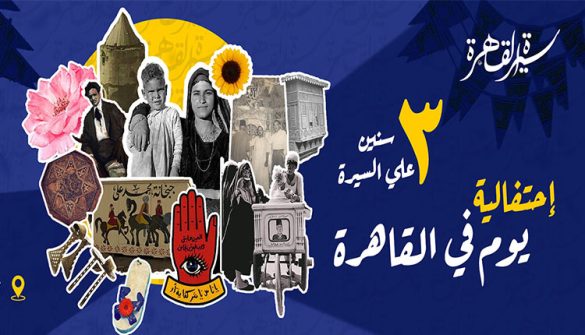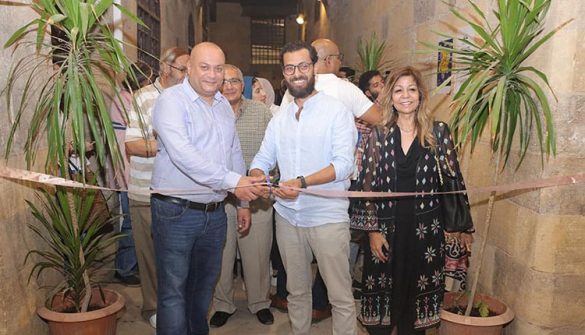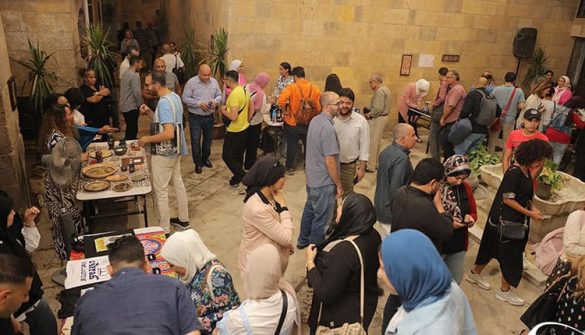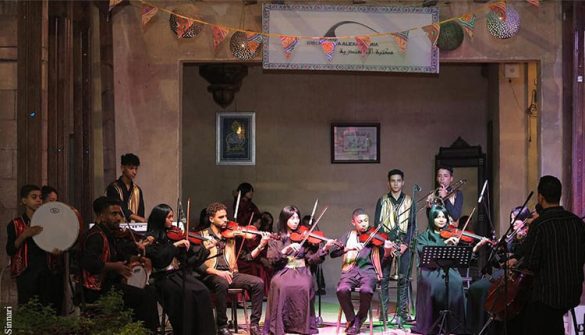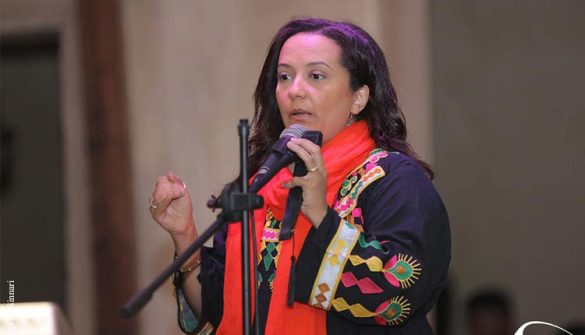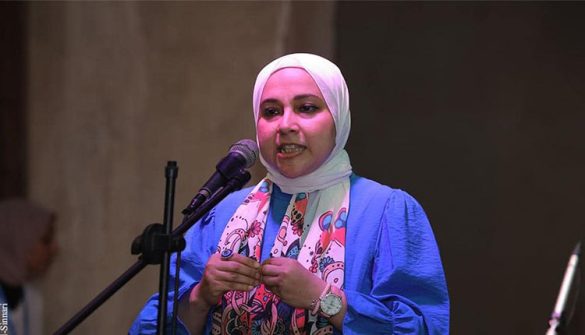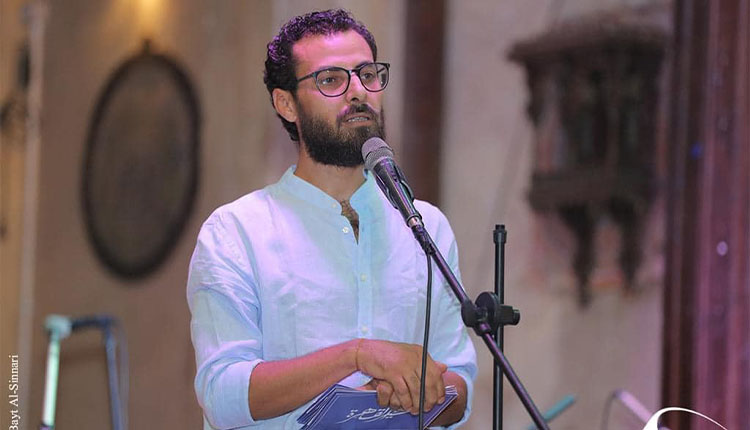At heart of old Cairo at Sayda Zainab district Cairo Biography initiative celebrated its the third anniversary at one of Cairo’s historical landmarks, Sinnari House. Amwal al Ghad English reporter attended the celebration and had an interview with Abdel-Azim Fahmy, founder of the initiative.
Fahmy is a researcher in cultural heritage, founder of Cairo Biography (Seera AlQahira). Born in Bab el bahr, a historical neighborhood in Bab al Shari’a district, one of the oldest districts in Cairo, he grew up charmed by the old architecture, alleys, mosques, cemeteries around the neighborhood. The passion for walking around the old city and discovering hidden places started when he was a young child. As he grew up consistently researching and wandering around the alleys and neighborhoods became a habit, discovering hidden architectural gems then navigating through historical sources like Al-Maqrizi’s Al-Mawa’iz wa al-‘i’tibar bi dhikr al-khitat wa al-‘athar (about the planning of Cairo and its monuments) and Al-Khitat al-Tawfiqiyah for Ali Mubarak Pasha.
Tell us about Cairo Biography (Seerat al Qahira) Initiative?
Cairo biography, the biography of the city, we normally use the word biography to narrate the story of a person, we also see the city as a living being having an extended story. We try to make a deeper understanding of the city and tell its story from different perspectives, the folk narrative ,the heritage aspect as well as the city from an authoritarian dimension and its urban perspective.
How did the idea of Cairo Biography start?
In 2020, the initiative started highlighting hidden unknown archaeological sites that nobody talks about, anonymous relics that were turned into dumps. We cleaned sites and highlighted their importance. Every Sunday we make a walk in a historical street in old Cairo, people started to join the walks. Then the group started to evolve as an initiative concerned with documenting and raising awareness about the city. We began by researching then writing about the sites we visited, holding seminars, making short documentaries telling the tales of old streets.
What are the aspirations of Cairo Biography? And how did your insight expand after three years?
Dreams of the initiative expanded by the time fueled by more people who showed interest in our path. We want to create a spirit of attachment to the city, a state of knowledge that makes people feel that they belong to the city. When local residents of historic streets acknowledge the value of their place, they feel unique and proud.
We aim to produce more documentary films about Cairo to create a visual material keeping pace with technology. We want to build a visual archive for the city in the form of documentaries. Create a site specialized for the city’s heritage. We aspire that Cairo would restore its status as a heritage city among the Arab, Islamic world and among the region.
We dream to launch Cairo Heritage week ,a week for events about Cairo featuring the heritage aspect of the city including folklore, traditions, language, handicrafts and food. It would be a modern carnaval showing scenes from different historical stages like displaying the caliph parade with soldiers, horses and uniforms. It would be a great opportunity for attracting tourists. we aim at making this big event through collaboration with local and international institutions that work on protecting the cultural heritage like UNESCO.
Did any public figures or institutions concerned with heritage cooperate with the initiative?
We collaborated with Sinnari House, which is affiliated to Alexandria library ,Cultural Development fund, Hadara Cinema center located at Cairo Opera house, affiliated to the Egyptian ministry of culture. Also the initiative was honored by the collaboration with Dr. Nizar el Sayad the distinguished urban historian and architect and professor at University of California Berkeley. Professor Nizar is collaborating with Cairo Biography to re-make his short film Al Qahira Bein el Qasrien that was produced in the 1970s. The film showcases the streets of Cairo as imagined from Naguib Mahfouz novel Bein el Qasrein (Palace Walk 1956).
How is the initiative funded?
Cairo Biography is totally self-funded, we seek a sustainable source of funding in order to guarantee the initiative’s continuity and to be able to have a professional branding.
What is the biggest achievement of the initiative from your stance?
I believe our biggest achievement was being able to communicate our passion for Cairo’s heritage to many people, creating awareness and bringing about a change in the cultural movement in Egypt. We produced more than 20 documentary films under a series named Men Dorobha al-Amera (Lively streets of the city)which are available on our Youtube channel, held seminars by historians and researchers and made different workshops. We were proudly awarded the shield of honor by Misr University for Science and Technology. Also two of our documentaries were screened at Cairo International Short Film festival. Cairo Biography is participating in Archinet 2023(the Arab Architecture Week), speaking about the popular narrative of the city.
What is your plan for the year 2024 ?
One of our projects is a documentary showcasing the city from the view of Novels, how people imagined the city through the description in literary works of Naguib Mahfouz and Khairy Shalaby. We are also working on a dramatic-documentary movie named The Absence , it tells the story of two men wandering around old Cairo in search of the cemetery of the Caliph of Cairo, al-Hakim bi-Amr Allah (996–1021).
A short film also will be soon released named Majazeb El Qarafa (City Obsessed men). Majzoub is a term that belongs to Islamic Sufism that implies a state of absolute love that makes a person lose the sense of himself out of the great love for his beloved. The film narrates different stories of Cairo through 10 men who are living in this state of love for the city.
What did your journey with Cairo Biography change inside you or taught you?
I am actually obsessed with the city. Cairo Biography gave my life a quest. The city has endless secrets that we can write about. I wish to communicate these feelings to all people. To convey this “sense of the city”. Heritage is a very important issue when talking about identity, it is our message to teach new generations about heritage ,to connect them with their roots, in a time young youths’ sense of belonging is mostly to social media. I believe it is essential that heritage be officially included in academic subjects at all levels of education.
